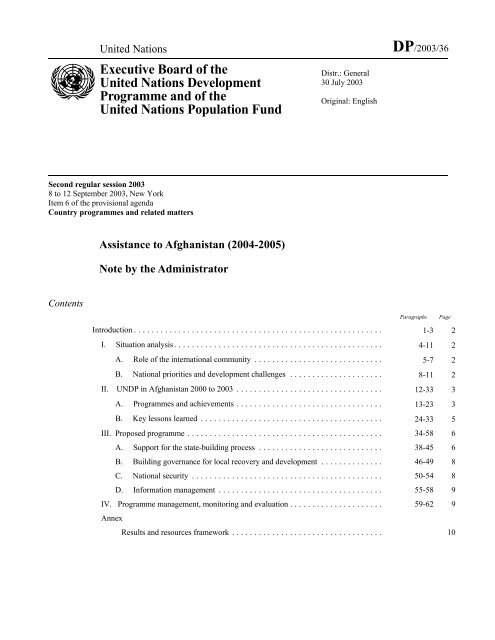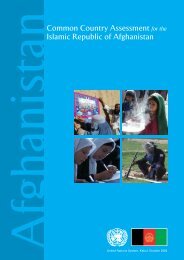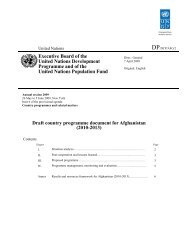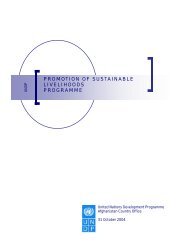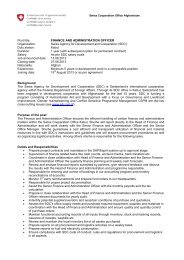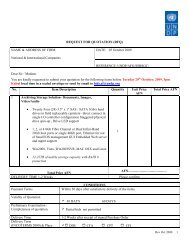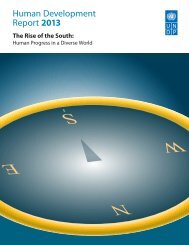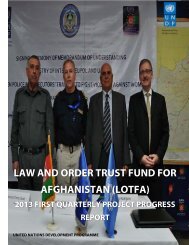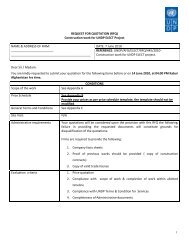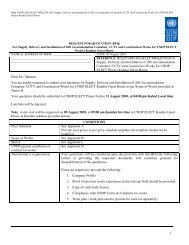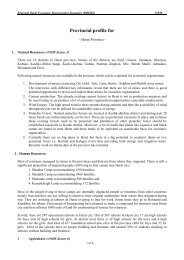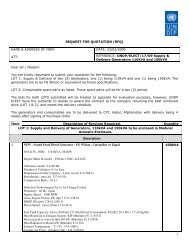UNDP Country Programme for Afghanistan 2004-2005
UNDP Country Programme for Afghanistan 2004-2005
UNDP Country Programme for Afghanistan 2004-2005
You also want an ePaper? Increase the reach of your titles
YUMPU automatically turns print PDFs into web optimized ePapers that Google loves.
United Nations DP/2003/36<br />
Executive Board of the<br />
United Nations Development<br />
<strong>Programme</strong> and of the<br />
United Nations Population Fund<br />
Distr.: General<br />
30 July 2003<br />
Original: English<br />
Second regular session 2003<br />
8 to 12 September 2003, New York<br />
Item 6 of the provisional agenda<br />
<strong>Country</strong> programmes and related matters<br />
Assistance to <strong>Afghanistan</strong> (<strong>2004</strong>-<strong>2005</strong>)<br />
Note by the Administrator<br />
Contents<br />
Paragraphs Page<br />
Introduction........................................................ 1-3 2<br />
I. Situation analysis............................................... 4-11 2<br />
A. Role of the international community ............................. 5-7 2<br />
B. National priorities and development challenges ..................... 8-11 2<br />
II. <strong>UNDP</strong> in <strong>Afghanistan</strong> 2000 to 2003 ................................. 12-33 3<br />
A. <strong>Programme</strong>s and achievements ................................. 13-23 3<br />
B. Key lessons learned ......................................... 24-33 5<br />
III. Proposed programme............................................ 34-58 6<br />
A. Support <strong>for</strong> the state-building process ............................ 38-45 6<br />
B. Building governance <strong>for</strong> local recovery and development .............. 46-49 8<br />
C. National security ........................................... 50-54 8<br />
D. In<strong>for</strong>mation management ..................................... 55-58 9<br />
IV. <strong>Programme</strong> management, monitoring and evaluation..................... 59-62 9<br />
Annex<br />
Results and resources framework.................................. 10
DP/2003/36<br />
Introduction A. Role of the international community<br />
1. Conflict and social upheaval have prevented the<br />
preparation of a <strong>UNDP</strong> country programme <strong>for</strong><br />
<strong>Afghanistan</strong> since 1984. In the absence of a <strong>for</strong>mal<br />
programme, the Executive Board has authorized the<br />
Administrator to support projects under a series of<br />
exemptions. The current arrangement covers the period<br />
2000-2003.<br />
2. Over the course of the next two years, <strong>2004</strong>-<strong>2005</strong>,<br />
the transitional period of building national institutions<br />
in <strong>Afghanistan</strong> under the Bonn Agreement is expected<br />
to culminate in a durable structure of governance<br />
tailored to the national culture and priorities. During<br />
the same period, the Government, the United Nations<br />
Assistance Mission to <strong>Afghanistan</strong> (UNAMA) and<br />
other United Nations institutions intend to prepare the<br />
first United Nations common country assessment<br />
(CCA) and United Nations Development Assistance<br />
Framework (UNDAF) <strong>for</strong> <strong>Afghanistan</strong>. <strong>UNDP</strong><br />
anticipates agreeing with the Government on a <strong>for</strong>mal<br />
country programme, synchronized with the<br />
programmes of other United Nations institutions, <strong>for</strong><br />
the following three to five years. The Millennium<br />
Development Goals (MDGs) will continue to serve as<br />
the overarching frame of reference.<br />
3. For the period <strong>2004</strong>-<strong>2005</strong>, the Administrator<br />
seeks the authorization of the Executive Board to<br />
continue to approve assistance on a project-by-project<br />
basis, consistent with the normal rules, regulations, and<br />
guidelines of <strong>UNDP</strong>.<br />
I. Situation analysis<br />
4. Prior to December 2001, <strong>Afghanistan</strong> lacked a<br />
legitimate, internationally recognized government with<br />
which international aid organizations could coordinate<br />
their activities. As a result, the international<br />
community typically worked directly with<br />
communities. In December 2001, the Bonn Agreement<br />
established an Afghan Interim Authority (AIA), with<br />
which international organizations immediately began<br />
cooperating. The AIA governed the country until an<br />
Emergency Loya Jirga was held in June 2002 to decide<br />
on a broad-based transitional authority. The transitional<br />
authority will govern until national elections are held<br />
in <strong>2004</strong>.<br />
5. Immediately after the signing of the Bonn<br />
Agreement, the World Bank, the Asian Development<br />
Bank and <strong>UNDP</strong> conducted a preliminary needs<br />
assessment showing a requirement of $14.5 billion<br />
over a 10-year period to support reconstruction,<br />
excluding humanitarian assistance, with requirements<br />
<strong>for</strong> the first 2.5 years of $4.9 billion. At the<br />
International Conference on Reconstruction Assistance<br />
to <strong>Afghanistan</strong>, held in Tokyo in January 2002, donors<br />
pledged $4.5 billion over 2.5 years. Most of the<br />
pledged resources appear likely to be disbursed, with<br />
the majority allocated to humanitarian relief.<br />
6. Since the Tokyo conference, the coordination of<br />
donor assistance to <strong>Afghanistan</strong> has moved steadily<br />
toward a process designed and driven by the<br />
Government, culminating in the presentation of a<br />
national development framework (NDF) to donors in<br />
April 2002. The national development budget (NDB),<br />
through which the Government is asking all<br />
international funding institutions to channel their<br />
assistance, converts the NDF strategy into an<br />
investment programme.<br />
7. With the replacement of United Nations Office<br />
<strong>for</strong> the Coordination of Humanitarian Affairs and the<br />
United Nations Special Mission to <strong>Afghanistan</strong><br />
(UNSMA) by UNAMA, the role of the United Nations<br />
in <strong>Afghanistan</strong> transitioned from direct coordination of<br />
international assistance to support <strong>for</strong> assumption of<br />
the coordination role by the Government. United<br />
Nations institutions seconded staff to sectoral<br />
“programme secretariats” within the Government and<br />
UNAMA initiated a move to integrate United Nations<br />
programmes within the NDF and NDB. A Governmentled<br />
consultative group process is now under way, with<br />
relevant ministries leading the preparation of<br />
programmes outlined in the NDB.<br />
B. National priorities and development<br />
challenges<br />
8. The NDF sets <strong>for</strong>th three national pillars of<br />
priority <strong>for</strong> development in <strong>Afghanistan</strong>: (a) expansion<br />
of human and social capital; (b) reconstruction of<br />
infrastructure and management of natural resources;<br />
and (c) building institutional, legal, and regulatory<br />
structures that facilitate private sector growth. Cross-<br />
2
DP/2003/36<br />
cutting priorities address gender, security and the rule<br />
of law, administrative and financial re<strong>for</strong>m, human<br />
rights, the environment, and the reintegration of<br />
refugees, internally displaced persons (IDPs) and<br />
<strong>for</strong>mer combatants. <strong>Afghanistan</strong>’s three primary<br />
development challenges – which correspond to the<br />
three national pillars of priority and are interrelated –<br />
may be described as follows.<br />
9. Social and economic reintegration. A large<br />
proportion of the population are in need of social and<br />
economic reintegration. Since the Bonn Agreement,<br />
about three million Afghan refugees and 700 000 IDPs<br />
have returned home or are expected to return soon, and<br />
about 300 000 people remain displaced within<br />
<strong>Afghanistan</strong>. Former combatants, many of whom have<br />
virtually no experience with civilian life, are also<br />
returning home. In the absence of viable alternatives,<br />
many farmers are resuming illegal poppy production.<br />
War and poverty have swelled the numbers of disabled<br />
people, widows, orphans and street children. Effective<br />
community development, income generation, and<br />
social protection <strong>for</strong> vulnerable people will require<br />
strengthened capacity and cooperation among all levels<br />
of government.<br />
10. Reconstruction of physical infrastructure. The<br />
roads, bridges, dams, irrigation canals, schools, health<br />
facilities, drinking water supplies and<br />
telecommunications facilities of <strong>Afghanistan</strong> are in a<br />
state of collapse. Reconstruction will require<br />
substantial resources and effective Government<br />
oversight.<br />
11. Rebuilding state institutions. The ability of the<br />
Government to mobilize the security, public services,<br />
and regulatory environment needed <strong>for</strong> sustainable<br />
human development depends on the capacity of its<br />
system of public administration. At the outset, the<br />
authorities faced a dire situation in this area –<br />
dilapidated or destroyed offices, poorly trained civil<br />
servants on a low and compressed pay scale, the<br />
exclusion of women from the work<strong>for</strong>ce, a ministerial<br />
structure in need of renewal, a legislative structure in<br />
disarray, a collapsed reporting framework between the<br />
center and provinces, a lack of national data, and little<br />
respect <strong>for</strong> the rule of law throughout society. The<br />
enormous challenge of public administration re<strong>for</strong>m<br />
lies ahead.<br />
II. <strong>UNDP</strong> in <strong>Afghanistan</strong> 2000 to 2003<br />
12. Following the events of late 2001, <strong>UNDP</strong> has<br />
adjusted its programme of assistance to meet the<br />
changing development needs of <strong>Afghanistan</strong>. The<br />
practice areas where the country office and the<br />
Government have established solid cooperation are<br />
democratic governance, poverty reduction, crisis<br />
prevention and recovery, and in<strong>for</strong>mation and<br />
communications technology (ICT).<br />
A. <strong>Programme</strong>s and achievements<br />
13. The Poverty Eradication and Community<br />
Empowerment (PEACE) Initiative. The PEACE<br />
Initiative predates the <strong>Afghanistan</strong> Interim Authority. It<br />
continued until 2002, at which time donor leadership<br />
<strong>for</strong> community development programming was<br />
designated to the World Bank. Implemented by the<br />
United Office <strong>for</strong> Project Services (UNOPS), the Food<br />
and Agriculture Organization of the United Nations<br />
(FAO), and the United Nations Human Settlement<br />
<strong>Programme</strong> (Habitat), PEACE supported communities<br />
in the repair of their infrastructure, providing jobs and<br />
skills to thousands of Afghans. It offered vaccinations<br />
and preventive care <strong>for</strong> livestock and enabled the<br />
country to meet its entire requirement of wheat seed<br />
from domestic production. It facilitated more than<br />
2 100 community groups (8 per cent <strong>for</strong>med by<br />
women) and provided rehabilitation and socioeconomic<br />
services to disabled people in areas throughout the<br />
country.<br />
14. Immediate operation of the Afghan Interim<br />
Authority. Only four days after the Interim Authority<br />
assumed office, <strong>UNDP</strong> advanced funds <strong>for</strong> basic office<br />
equipment and supplies, which were handed over to the<br />
new ministries. Under the leadership of UNAMA,<br />
<strong>UNDP</strong> established and managed the Afghan Interim<br />
Authority Fund (AIAF), making possible the rapid and<br />
flexible disbursement of $72 million in donor funding<br />
during the first half of 2002. The AIAF funded (a) the<br />
salaries of 240 000 civil servants, in all 32 provinces,<br />
and the establishment of a payroll system; (b) basic<br />
repairs to, and equipping of, government buildings;<br />
(c) the establishment of national commissions as<br />
mandated by the Bonn Agreement; and (d) the national<br />
process leading to the Emergency Loya Jirga that<br />
selected the transitional Government, and the<br />
Emergency Loya Jirga itself.<br />
3
DP/2003/36<br />
15. The national commissions. The Bonn Agreement<br />
calls <strong>for</strong> the Afghan Government to establish, with the<br />
assistance of the United Nations, a number of<br />
commissions to lead the country towards democracy<br />
and the rule of law. In collaboration with UNAMA,<br />
United Nations Volunteers (UNV), and other partners,<br />
<strong>UNDP</strong> has supported the establishment and operation<br />
of the Emergency Loya Jirga Commission, the<br />
Constitutional Commission, the Judicial Re<strong>for</strong>m<br />
Commission, the Civil Service Commission, and the<br />
Human Rights Commission. <strong>UNDP</strong> seconded one of its<br />
most senior Afghan professionals as the Director of the<br />
Secretariat to the Constitutional Commission.<br />
16. In<strong>for</strong>mation management and aid coordination.<br />
<strong>UNDP</strong> has actively supported the upgrading of<br />
in<strong>for</strong>mation management in <strong>Afghanistan</strong>.<br />
Achievements supported by <strong>UNDP</strong>, the European<br />
Commission, and the Government of France to date<br />
include (a) the development of a national ICT policy<br />
through a consultative process led by the Ministry of<br />
Communications; (b) the transfer of the “.af” country<br />
code Top Level Domain to <strong>Afghanistan</strong>, marking a key<br />
symbolic break with the Taliban years, when Internet<br />
use was prohibited; (c) expansion of ICT access<br />
through the establishment of an Intranet system <strong>for</strong> the<br />
Government (with the World Bank); (d) establishment<br />
of a Cisco Networking Academy <strong>Programme</strong> at Kabul<br />
University; and (e) the establishment of basic ICT<br />
training centers in Kabul and other cities.<br />
17. UNAMA has the lead role in coordinating the<br />
operational activities of United Nations institutions,<br />
including their support to the consultative group and<br />
national budget processes. Under the leadership of<br />
UNAMA, <strong>UNDP</strong> helped the Government to establish<br />
an Aid Coordination Unit and a Public In<strong>for</strong>mation<br />
Unit within the Afghan Assistance Coordination<br />
Agency. Among other activities, the Aid Coordination<br />
Unit created a donor assistance database in response to<br />
the NDF’s call <strong>for</strong> a donor tracking system. <strong>UNDP</strong> is<br />
also supporting the national data requirements of the<br />
NDF.<br />
18. Afghan women and governance. The NDF calls<br />
<strong>for</strong> “specific programmes directed to enhancing the<br />
capabilities of our girls and women”. Toward this<br />
objective, <strong>UNDP</strong> has (a) supported Afghan women’s<br />
groups in securing women’s participation in the<br />
Emergency Loya Jirga; (b) funded (through the AIAF)<br />
the physical rehabilitation and Internet connection of<br />
the Ministry of Women’s Affairs; and (c) provided<br />
ongoing institutional capacity-building support to the<br />
Ministry, including gender training and women’s<br />
professional training, in collaboration with the United<br />
Nations Women’s Fund (UNIFEM), UNAMA and<br />
UNV.<br />
19. National security. <strong>UNDP</strong> supports the<br />
foundations <strong>for</strong> national security in <strong>Afghanistan</strong> in<br />
three areas: the creation of a national civilian police<br />
service, the disarmament, demobilization, and<br />
reintegration (DDR) of combatants, and mine action.<br />
With their salaries covered by the AIAF, the police<br />
returned to work in Kabul immediately after the Bonn<br />
Agreement. Together with UNAMA police advisers,<br />
and with Germany as the lead donor country, <strong>UNDP</strong><br />
established the Law and Order Trust Fund <strong>for</strong><br />
<strong>Afghanistan</strong> (LOTFA), which accords first priority to<br />
covering police salaries.<br />
20. The Government, UNAMA, and <strong>UNDP</strong> – with<br />
Japan as the lead donor country – have established a<br />
three-year programme <strong>for</strong> DDR. The programme serves<br />
as the secretariat to the four DDR commissions and is<br />
establishing offices and building DDR capacity in<br />
Kabul and in eight provinces. To help build national<br />
capacity in mine action, <strong>UNDP</strong> works with the United<br />
Nations Mine Action Centre <strong>for</strong> <strong>Afghanistan</strong>, and will<br />
collaborate to explore suitable government counterpart<br />
arrangements <strong>for</strong> the future. A comprehensive landmine<br />
impact survey is currently under way.<br />
21. Area-based development. The national areabased<br />
development programme (NABDP) is a major<br />
Government initiative set <strong>for</strong>th in the NDF. The<br />
programme encompasses development activities in<br />
10 vulnerable areas of <strong>Afghanistan</strong> while building<br />
government capacity to lead and coordinate<br />
participatory development in all provinces. <strong>UNDP</strong> is<br />
designated as the lead agency to support the Ministry<br />
of Rural Rehabilitation and Development (MRRD) as it<br />
designs and manages the NABDP. The achievements of<br />
the programme include (a) organizational re<strong>for</strong>ms<br />
within the MRRD; (b) rehabilitation of the provincial<br />
offices of the MRRD; (c) development of a provincial<br />
coordination mechanism and planning process; and<br />
(d) regular monitoring exercises and MRRD training in<br />
monitoring and evaluation and provision of urgent<br />
recovery support with UNOPS, FAO, and Habitat as<br />
implementing partners. These and other planned<br />
capacity-building initiatives facilitate the management<br />
and implementation of other national programmes.<br />
4
DP/2003/36<br />
22. Urban recovery and employment. The Recovery<br />
and Employment <strong>Afghanistan</strong> <strong>Programme</strong> (REAP) is a<br />
quick-impact public works programme supported by<br />
<strong>UNDP</strong> and UNV. In Kabul, Kandahar, and Jalalabad,<br />
REAP has (a) employed more than 45,000 people—<br />
mainly IDPs, returnees, and <strong>for</strong>mer combatants—in the<br />
rehabilitation of small infrastructure, including projects<br />
to improve women’s living conditions; (b) established<br />
vocational training centres <strong>for</strong> women; (c) provided<br />
workers with tools used in their work, enabling them to<br />
offer their skills to other potential employers; and<br />
(d) helped to build the capacity of more than<br />
20 municipalities and ministries and more than<br />
30 community groups. REAP is now becoming part of<br />
the Ministry of Urban Development and Housing.<br />
23. Support to disabled Afghans. The Comprehensive<br />
Disabled Afghans <strong>Programme</strong> (CDAP), implemented<br />
by UNOPS, has provided rehabilitation and socioeconomic<br />
services to disabled people since 1991. With<br />
400 national staff members and 2 000 trained<br />
community volunteers, CDAP reaches 20 000 disabled<br />
people each year (totalling over 150 000 since the<br />
programme started in 1991) in 58 districts and eight<br />
cities of <strong>Afghanistan</strong>.<br />
B. Key lessons learned<br />
24. The following lessons learned by <strong>UNDP</strong> from the<br />
experiences of the past few years have been<br />
incorporated in the design of future programming.<br />
25. Government mechanisms <strong>for</strong> leading and<br />
coordinating international assistance. Such mechanisms<br />
are vital to the success and legitimacy of the recovery<br />
and development ef<strong>for</strong>ts. The early establishment of<br />
the NDF under national leadership, the NDB, and the<br />
consultative group process ensured focus, coherence,<br />
and national leadership in assistance programming. All<br />
<strong>UNDP</strong> programming and resource mobilization take<br />
place within these guiding mechanisms.<br />
26. Building the national capacity needed <strong>for</strong><br />
effective government-led recovery and development. As<br />
the Government strengthens its leadership of recovery<br />
and development, an increasing programming focus is<br />
needed on helping Afghans create governance<br />
structures, systems, and procedures that facilitate the<br />
achievement of national goals. All support <strong>for</strong> re<strong>for</strong>ms<br />
should ensure that while international best practices are<br />
introduced, the best of the existing laws and<br />
administrative systems and procedures are retained.<br />
Working through Government structures has more<br />
impact than creating parallel project implementation<br />
structures. The <strong>UNDP</strong> national execution modality can<br />
help accelerate the building of national ownership,<br />
enhancing impact and creating sustainability.<br />
27. Flexibility and responsiveness to evolving national<br />
priorities. <strong>UNDP</strong> programming changes in the period<br />
2000-2003 reflect the evolving – and increasingly wellarticulated<br />
– priorities of the Government <strong>for</strong><br />
reconstruction and development. Flexibility is essential<br />
to effective assistance programming.<br />
28. Regular assessments of <strong>UNDP</strong> country office<br />
capacities. The <strong>UNDP</strong> country office must continually<br />
adjust its human resource and operational profile to<br />
suit national needs, priorities, and programming focus.<br />
Assessments are needed to ensure flexibility and<br />
responsiveness.<br />
29. Support <strong>for</strong> governance re<strong>for</strong>ms. As the<br />
Government strengthens its leadership of national<br />
reconstruction and development, capacity-building<br />
support <strong>for</strong> the establishment of structures, systems,<br />
and procedures that facilitate the achievement of<br />
national goals is paramount. <strong>UNDP</strong> support should<br />
ensure that while international best practices are<br />
introduced, the best of the existing laws and<br />
administrative systems and procedures are retained.<br />
30. Quick-impact, labor-intensive projects to create<br />
employment and rebuild infrastructure. These projects<br />
have an essential role in the early stages of<br />
reconstruction. Their sustainable impact depends on<br />
success in transferring to national authorities the<br />
capacity to plan and manage activities and stimulate<br />
economic regeneration, providing longer-term<br />
livelihood opportunities. Effectively managed public<br />
works projects have the potential to expand<br />
opportunities <strong>for</strong> employment, reintegration, and<br />
reconciliation while accelerating the reconstruction of<br />
essential social and economic infrastructures.<br />
31. Local planning and coordination mechanisms.<br />
Such mechanisms have the potential to ensure that<br />
locally generated priorities are incorporated in the<br />
overall budgeting cycle of the Government, and they<br />
there<strong>for</strong>e deserve careful attention. Community<br />
mobilization, even during the years of severe national<br />
upheaval, helped many communities organize<br />
themselves into in<strong>for</strong>mal structures of local<br />
governance. Their interface with decentralized <strong>for</strong>mal<br />
government structures now provides opportunities <strong>for</strong><br />
5
DP/2003/36<br />
cooperation across the various levels of Afghan<br />
society.<br />
32. Effective support <strong>for</strong> the gender objectives of the<br />
Government. The restoration of women’s rights is a<br />
national priority that must <strong>for</strong>m an integral – and<br />
carefully targeted – component of all programming.<br />
This will require continuing cultural sensitivity, an<br />
Afghan-driven process of mainstreaming gender, and a<br />
measured pace of change. Particular attention is needed<br />
<strong>for</strong> gender research, policy, and institutional capacity<br />
building. National momentum <strong>for</strong> this process is<br />
evident in the substantial demand, on the part of the<br />
ministries and the Office of the President, <strong>for</strong> the<br />
training programmes of the Ministry of Women’s<br />
Affairs.<br />
33. Security and economic development are<br />
interrelated objectives that must be pursued in tandem.<br />
A favorable security environment is needed <strong>for</strong> the<br />
success of both relief and development activities. At<br />
the same time, economic development that fosters<br />
legitimate livelihoods – particularly alternatives to<br />
soldiering and poppy farming – is needed <strong>for</strong> the<br />
sustainable rehabilitation of security services.<br />
III. Proposed programme<br />
34. The Government and <strong>UNDP</strong> have identified four<br />
principal areas of cooperation <strong>for</strong> the period <strong>2004</strong>-<br />
<strong>2005</strong>: (a) Support <strong>for</strong> the state-building process;<br />
(b) building governance <strong>for</strong> local recovery and<br />
development; (c) national security; and (d) in<strong>for</strong>mation<br />
management.<br />
35. These are areas where national priorities coincide<br />
with the global mandate of <strong>UNDP</strong>, and where lessons<br />
learned from previous <strong>UNDP</strong> cooperation in<br />
<strong>Afghanistan</strong> can be incorporated. All activities will<br />
take place with government leadership, and <strong>UNDP</strong> will<br />
collaborate closely with the ministries, agencies, and<br />
donors leading programmes within the consultative<br />
group process. Given the imperative of empowering<br />
Afghan women and promoting gender equality in<br />
<strong>Afghanistan</strong>, the Government and <strong>UNDP</strong> will ensure<br />
that gender issues are consistently mainstreamed and<br />
carefully paced. In addition to the direct support<br />
provided to the national security sector, all programme<br />
activities will aim to consolidate peace and to enhance<br />
security by helping the Government to provide public<br />
services, create an enabling environment <strong>for</strong> legitimate<br />
livelihoods, and promote respect <strong>for</strong> the rule of law. To<br />
the extent possible, all activities will aim <strong>for</strong><br />
countrywide impact.<br />
36. <strong>UNDP</strong> will remain flexible and responsive to<br />
evolving national priorities. In <strong>2004</strong>, the first National<br />
Human Development Report (NHDR) of <strong>Afghanistan</strong><br />
will provide an important vehicle <strong>for</strong> the Government<br />
to refine the priorities of the country and to identify<br />
new areas where targeted cooperation with<br />
international humanitarian organizations can accelerate<br />
recovery and development. The NHDR will be the first<br />
comprehensive review of the state of development of<br />
<strong>Afghanistan</strong>. <strong>UNDP</strong> will stand ready to act in response<br />
to needs identified based on the NHDR as well as the<br />
CCA/UNDAF process.<br />
37. Throughout the period, <strong>UNDP</strong> will work under<br />
the UNAMA umbrella and will ensure maximum<br />
collaboration and programme complementarity with<br />
other international actors such as the World Bank and<br />
the Asian Development Bank, as well as with United<br />
Nations institutions such as UNICEF, the Office of the<br />
High Commissioner <strong>for</strong> Refugees (UNHCR), UNFPA,<br />
UNIFEM, the World Food <strong>Programme</strong> (WFP), the<br />
Food and Agriculture Organization (FAO) and the<br />
United Nations Office <strong>for</strong> Project Services (UNOPS).<br />
United Nations Volunteers will play an increasingly<br />
important role in the delivery of development<br />
assistance in all areas, providing a high level of skills<br />
at reasonable cost. Finally, <strong>UNDP</strong> will be ready to<br />
provide increasing support to UNAMA in the<br />
coordination of operational activities among United<br />
Nations agencies and in the provision of common<br />
services.<br />
A. Support <strong>for</strong> the state-building process<br />
Public administration re<strong>for</strong>m<br />
38. The NDB sets <strong>for</strong>th plans <strong>for</strong> a Public<br />
Administration Re<strong>for</strong>m (PAR) sub-programme,<br />
identifying seven key pillars (some of which sit outside<br />
the PAR sub-programme) that are central to the<br />
establishment of an effective civil service: (a) the civil<br />
service legal framework; (b) personnel management;<br />
(c) institutional and functional streamlining and<br />
development; (d) financial management and<br />
accountability; (e) policy management and machinery<br />
of government; (f) administrative efficiency; and<br />
(g) physical infrastructure. The Administrative Re<strong>for</strong>m<br />
and Civil Service Commission (ARCSC) is responsible<br />
6
DP/2003/36<br />
<strong>for</strong> leading and coordinating the <strong>Programme</strong> and <strong>for</strong><br />
implementing some of its projects.<br />
39. Recognizing the need <strong>for</strong> a government-wide and<br />
inclusive approach, the ARCSC is <strong>for</strong>ming an interministerial<br />
group on administrative re<strong>for</strong>m. Contact<br />
groups will be established within ministries and in the<br />
provinces to exchange ideas and in<strong>for</strong>mation. As a first<br />
step towards streamlining Government institutions and<br />
identifying capacity-building needs, the ARCSC has<br />
launched an assessment of the structure, functions, and<br />
staffing of ministries and other government agencies. A<br />
presidential decree has been prepared to provide<br />
incentives <strong>for</strong> early re<strong>for</strong>ms within ministries. These<br />
steps are expected to clarify specific needs and<br />
priorities <strong>for</strong> PAR.<br />
40. Over the past year, a consensus has emerged<br />
among many government officials and donors that<br />
<strong>UNDP</strong> is well placed to support the Government in<br />
PAR. All such support will take place under the<br />
leadership of the ARCSC and in consultation with the<br />
World Bank and the European Commission. <strong>UNDP</strong> will<br />
provide continuing advisory services to the ARCSC<br />
and will recruit public administration re<strong>for</strong>m experts,<br />
both Afghan and international, in line with Government<br />
requests and donor support. In partnership with the<br />
Government of France, <strong>UNDP</strong> will continue to support<br />
pilot schemes to lay the groundwork <strong>for</strong> overall re<strong>for</strong>m.<br />
It will further support in-service training and <strong>for</strong>mal<br />
training of civil servants and will assist in capacity<br />
building of related Government training institutes.<br />
Institutions <strong>for</strong> social justice<br />
41. In completing the Bonn process, the Islamic<br />
Transitional State of <strong>Afghanistan</strong> anticipates launching<br />
the rebuilding and development of effective national<br />
systems of elections, justice, and human rights<br />
promotion and protection. <strong>UNDP</strong> will facilitate the<br />
state-building process in <strong>Afghanistan</strong> in each of these<br />
key areas.<br />
42. Following the adoption of a new Constitution late<br />
in 2003, elections are envisaged in <strong>2004</strong>. UNAMA and<br />
the Electoral Assistance Division of the United Nations<br />
Department of Political Affairs are leading United<br />
Nations support <strong>for</strong> the electoral process in<br />
<strong>Afghanistan</strong>. <strong>UNDP</strong> is providing technical assistance<br />
on elections and is prepared to expand its support in<br />
this area as and when requested. In particular, <strong>UNDP</strong><br />
envisions facilitating voter registration, supporting<br />
elections monitoring, and contributing even-handed<br />
capacity-building and coordination support to political<br />
contestants. UNV is prepared to mobilize large<br />
numbers of volunteer experts to facilitate the elections<br />
process, and UNOPS will offer rapid procurement at<br />
reasonable cost as needed <strong>for</strong> the elections.<br />
43. In support of the Judicial Commission, <strong>UNDP</strong> –<br />
with Italy as the lead donor country – will support<br />
(a) civic education on the new constitution; (b) the<br />
<strong>for</strong>ging of links and partnerships between legal actors<br />
in Kabul and regions, with particular attention to the<br />
role of women in the judicial system; (c) the<br />
strengthening of judicial institutions such as the<br />
Supreme Court, the Ministry of Justice and the Office<br />
of the Attorney General; and (d) the rehabilitation of<br />
courthouses and other judicial facilities in all<br />
provinces.<br />
44. <strong>UNDP</strong> will continue to promote the<br />
mainstreaming of human rights into Afghan law,<br />
policy, development programming, and the framework<br />
of national institutions. In collaboration with UNAMA,<br />
Denmark (as the lead donor country) and other<br />
partners, <strong>UNDP</strong> will help the AIHRC to (a) implement<br />
a programme of public education on human rights;<br />
(b) build its capacity to process complaints and<br />
petitions and to resolve conflicts; (c) manage human<br />
rights data; and (d) ensure human rights<br />
mainstreaming.<br />
Afghan women in governance<br />
45. <strong>UNDP</strong> will continue its programme of<br />
capacity-building support to the Ministry of Women’s<br />
Affairs in partnership with UNAMA, UNIFEM, UNV,<br />
and the United States Agency <strong>for</strong> International<br />
Development (USAID). By early <strong>2004</strong>, this support is<br />
expected to have provided the Ministry with a solid<br />
foundation <strong>for</strong> managing its own gender-training<br />
programme <strong>for</strong> the Afghan transitional authority and<br />
civil society. As the Ministry extends its gender<br />
mainstreaming activities to the provinces, across<br />
ministries, and within civil society, <strong>UNDP</strong> will provide<br />
follow-up technical assistance as needed. Beyond<br />
training, <strong>UNDP</strong> expects to participate in a strategic<br />
gender policy review and to support the development<br />
of a national gender strategy that integrates gender<br />
programming across health, education, employment,<br />
law, human rights, peace building, and other sectors.<br />
Gender-related areas of national priority identified<br />
through the NHDR will receive particular attention.<br />
7
DP/2003/36<br />
B. Building governance <strong>for</strong> local recovery<br />
and development<br />
46. <strong>UNDP</strong> cooperation <strong>for</strong> local recovery and<br />
development will continue in area-based development,<br />
urban recovery, meeting the needs of disabled people,<br />
and other areas. For area-based development, the<br />
NABDP supports urgent recovery projects, government<br />
capacity building at all levels, and medium- and longterm<br />
development projects to stimulate local<br />
economies. During the period <strong>2004</strong>-<strong>2005</strong>, <strong>UNDP</strong><br />
anticipates deepening its support <strong>for</strong> the <strong>for</strong>mation of<br />
coordination and planning mechanisms that ensure<br />
participation, transparency and accountability at the<br />
provincial and district level. With experience, the<br />
planning process is expected to become increasingly<br />
inclusive, gathering broader input from civil society<br />
and the private sector and encouraging their growth.<br />
Linkages across levels of government in the planning<br />
process will ensure that locally generated priorities are<br />
incorporated in the planning and budgeting cycle of the<br />
Government. Through its umbrella approach, under the<br />
leadership of the Ministry of Rural Rehabilitation and<br />
Development, the NABDP will support the national<br />
solidarity programme (NSP) and related initiatives.<br />
47. Operating from within the Ministry of Urban<br />
Development and Housing, REAP will help the<br />
Government build capacity to create employment and<br />
rebuild infrastructure in urban areas throughout the<br />
country. The Ministry anticipates complementing the<br />
DDR programme by offering public works and<br />
vocational training opportunities to <strong>for</strong>mer combatants.<br />
In cooperation with Habitat, <strong>UNDP</strong> will provide<br />
continuing technical advice and resource mobilization<br />
support to government bodies involved in urban<br />
recovery and employment.<br />
48. <strong>UNDP</strong> support <strong>for</strong> disabled Afghans, which now<br />
involves primarily community-based rehabilitation and<br />
socio-economic services with implementation support<br />
from UNOPS and the Swedish Committee <strong>for</strong><br />
<strong>Afghanistan</strong>, will shift towards building sustainable<br />
capacity within the Government to design disability<br />
policies and manage rehabilitation projects. In the<br />
same context, these activities will shift towards a<br />
national execution modality. Linkages are anticipated<br />
between the national mine action programme and<br />
programmes to benefit disabled Afghans.<br />
49. In addition, <strong>UNDP</strong> will respond flexibly to<br />
evolving priorities, including possible support to the<br />
preparation of a national poverty reduction strategy. In<br />
areas of high return and IDP settlement, <strong>UNDP</strong> will<br />
collaborate with the Government, UNHCR, and other<br />
United Nations institutions in the context of the “4-Rs”<br />
process: repatriation, reintegration, rehabilitation, and<br />
reconstruction. In January 2003, <strong>UNDP</strong> and UNHCR<br />
signed a letter of agreement, and the MRRD, <strong>UNDP</strong>,<br />
and UNHCR signed a tripartite agreement outlining<br />
their respective roles and areas of cooperation in the<br />
Afghan process of reintegrating returnees and IDPs.<br />
C. National security<br />
50. Security and economic development are<br />
interrelated objectives that the Afghan Transitional<br />
Authority is pursuing simultaneously. <strong>UNDP</strong> will<br />
strengthen its support <strong>for</strong> three vital areas of national<br />
security in <strong>2004</strong>-<strong>2005</strong>: police capacity building, DDR,<br />
mine action, and disaster management. Progress in<br />
these areas will depend on the prevailing security<br />
situation.<br />
51. During the transition period, <strong>UNDP</strong> management<br />
of LOTFA will channel international support towards<br />
the creation of a well-trained, well-equipped, and<br />
regularly paid national police service. With Germany<br />
as the lead donor country and UNAMA providing<br />
police advisers, LOTFA aims to support nationwide<br />
recruitment and training, procurement of non-lethal<br />
equipment, and rehabilitation of police facilities.<br />
Beyond transition, <strong>UNDP</strong> envisions providing<br />
continuing support <strong>for</strong> the Ministry of Interior to<br />
maintain a national police service with a genuinely<br />
integrated ethnic composition and a solid<br />
understanding of the need <strong>for</strong> transparency,<br />
accountability, and human rights protection.<br />
52. The Afghan DDR process began in mid-2003<br />
with support from UNAMA, <strong>UNDP</strong>, and Japan as the<br />
lead donor country. The reintegration strategy will aim<br />
to create conditions <strong>for</strong> demobilized soldiers to become<br />
productive members of their communities through<br />
employment creation, credit opportunities, vocational<br />
training and access to education. Critical linkages will<br />
be established with other programmes – such as area<br />
based development, urban public works, and mine<br />
action – in identifying opportunities <strong>for</strong> <strong>for</strong>mer<br />
combatants to engage productively in the nationbuilding<br />
process. The programme anticipates drawing<br />
heavily upon the skills of UNVs. It will complement<br />
the collaborative activities of the Government,<br />
8
DP/2003/36<br />
UNAMA, and the Government of the United States in<br />
the development of the Afghan National Army.<br />
53. <strong>UNDP</strong> will work with MACA, the Government of<br />
Canada and other partners to strengthen national<br />
capacity <strong>for</strong> mine action. The LIS currently being<br />
conducted will provide a socio-economic basis <strong>for</strong><br />
prioritizing mine clearance activities and <strong>for</strong>mulating a<br />
national strategy <strong>for</strong> mine action. In accordance with<br />
Government requests, <strong>UNDP</strong> will support the<br />
development of the strategy and capacity building <strong>for</strong><br />
its implementation.<br />
54. <strong>UNDP</strong> also envisions expanding its support <strong>for</strong><br />
the effective operation of the Office of Disaster<br />
Preparedness (ODP) in collaboration with UNAMA,<br />
the Asian Development Bank, and the German nongovernmental<br />
organization InWent, within the<br />
framework of the role and functions identified <strong>for</strong> ODP<br />
by the Government.<br />
D. In<strong>for</strong>mation management<br />
55. <strong>UNDP</strong> will support the strengthening of<br />
in<strong>for</strong>mation management capacity in <strong>Afghanistan</strong><br />
through interventions in three areas: (a) ICT policy,<br />
capacity, and access; (b) aid coordination; and (c) data<br />
management.<br />
56. ICT programming will aim to (a) advocate <strong>for</strong><br />
Government ownership and implementation of the<br />
national ICT policy; (b) facilitate the updating of the<br />
policy to incorporate feedback and account <strong>for</strong> growing<br />
private sector involvement; (c) provide regular policy<br />
advice at senior levels; (d) expand ICT training support<br />
to towns and cities throughout <strong>Afghanistan</strong> and<br />
encourage private sector responsibility <strong>for</strong> specialist<br />
ICT training; and (e) support the creation of an<br />
enabling framework <strong>for</strong> Internet service providers and<br />
public Internet access points.<br />
57. <strong>UNDP</strong> will assist the aid coordination ef<strong>for</strong>ts of<br />
the Government through continuing support to the<br />
consultative group process and the donor assistance<br />
database. To promote transparency and realistic<br />
expectations <strong>for</strong> reconstruction, <strong>UNDP</strong> will support a<br />
public in<strong>for</strong>mation centre and a national team of public<br />
in<strong>for</strong>mation specialists.<br />
58. <strong>UNDP</strong> will expand its support <strong>for</strong> data<br />
management in anticipation of the NHDR produced by<br />
<strong>Afghanistan</strong>, national monitoring of the MDGs, and in<br />
the preparation of a CCA and an UNDAF. The<br />
<strong>Afghanistan</strong> In<strong>for</strong>mation Management Service will<br />
become a vehicle <strong>for</strong> building national data<br />
management capacity. In addition, <strong>UNDP</strong> anticipates a<br />
role in conducting a national census, preparing the<br />
national data strategy, and establishing an independent<br />
policy development institute.<br />
IV. <strong>Programme</strong> management,<br />
monitoring and evaluation<br />
59. <strong>UNDP</strong> will continue to support accelerated<br />
national ownership of development programming in<br />
<strong>Afghanistan</strong>. The process of shifting from direct<br />
execution by <strong>UNDP</strong> and other United Nations<br />
institutions national execution is under way, with<br />
government officials receiving training and<br />
participating in the design of transition strategies.<br />
Some projects are already nationally executed, and<br />
acceleration of this process will be given as high a<br />
priority as the progress in national capacity building<br />
will allow. <strong>UNDP</strong> will strengthen its own capacity to<br />
undertake the various programmes envisaged. It will<br />
rely increasingly on qualified Afghan nationals,<br />
recruited from within the country and internationally,<br />
<strong>for</strong> programme design and implementation. Several<br />
initiatives are helping to build the capacity of the<br />
Government to monitor and evaluate its programmes<br />
by strengthening national data management.<br />
60. <strong>UNDP</strong> will contribute actively to the consultative<br />
group process in partnership with ministries, agencies,<br />
and donors. This involvement will complement the<br />
growing role of <strong>UNDP</strong> in coordinating the operational<br />
activities of United Nations institutions and in<br />
providing common services.<br />
61. Achievements of results during this period will of<br />
course be greatly influenced by the overall security<br />
situation. The goals and objectives anticipated in this<br />
note will depend on a continued successful<br />
development towards a sustainable peace.<br />
62. All resource mobilization ef<strong>for</strong>ts will take place<br />
under Government leadership within the national<br />
budgeting and consultative group processes. It is<br />
expected that major resources mobilization ef<strong>for</strong>ts will<br />
be undertaken with donor countries in conjunction with<br />
some of the largest programmes such as NABDP,<br />
REAP, LOTFA and DDR.<br />
9
DP/2003/36<br />
Annex. Results and resources framework<br />
Strategic area of support Intended outcomes Outcome indicators<br />
A. Support to the state-building process<br />
A.1. Public administration re<strong>for</strong>m<br />
Efficiency and<br />
accountability in the civil<br />
service<br />
Efficiency, accountability, and<br />
transparency improved in the<br />
seven PAR areas of national<br />
priority<br />
Level of efficiency, accountability and transparency in public<br />
administration (specific indicators to be developed <strong>for</strong> each of the<br />
seven PAR areas);<br />
Level of Ideas/in<strong>for</strong>mation on re<strong>for</strong>m shared among contact<br />
groups within ministries and in the provinces.<br />
Outputs<br />
Completed assessment of Government structure, functions, and staffing;<br />
Action plans prepared/implemented in the seven PAR areas;<br />
Inter-ministerial group on PAR <strong>for</strong>med and in operation;<br />
Restructuring plan devised and implemented;<br />
<strong>Programme</strong>s of incentives <strong>for</strong> early re<strong>for</strong>ms within ministries established and operational<br />
until new salary structure is introduced.<br />
A.2. State-building <strong>for</strong> social justice<br />
Electoral legislation and<br />
institutional capacity of<br />
electoral commissions,<br />
systems, and processes<br />
A free and fair national elections<br />
system established<br />
Degree to which election is free and fair;<br />
Percentage of voting age population included in voter registration;<br />
International monitoring arranged to ensure elections held<br />
according to Bonn Agreement.<br />
Facilities <strong>for</strong> voter registration in place;<br />
Trained national elections monitors;<br />
Capacity built to support contestants;<br />
Approved elections policies;<br />
Central elections committee in operation.<br />
Administration of, and<br />
access to, justice and<br />
promotion of human rights<br />
Mechanisms to promote access<br />
to justice, and protect human<br />
rights in accordance with Islamic<br />
principles, Afghan legal<br />
traditions and international<br />
standards<br />
Degree to which human rights among all population groups and<br />
regions of the country are protected;<br />
Increased presence of women at all levels in the judicial system;<br />
At least one major legal education, training, and research<br />
institution established and operational;<br />
Ability of Afghan Independent Human Rights Commission<br />
(AIHRC) to process complaints and petitions, conflict resolution;<br />
Number of public education programmes on human rights<br />
conducted.<br />
Supreme Court, Ministry of Justice, and Attorney General’s Office in full operation;<br />
Judicial facilities rehabilitated in all provinces;<br />
Strengthened capacity of AIHRC to promote and protect human rights;<br />
Linkages established between legal actors in Kabul and the regions;<br />
Civic education on the Constitution provided;<br />
Training programme on conflict resolution <strong>for</strong> local government officials and NGOs<br />
established and implemented.<br />
A.3. Afghan women in governance<br />
Policy dialogue to improve<br />
the condition of women and<br />
remove barriers to<br />
advancement.<br />
Gender issues mainstreamed in<br />
programmes initiated by the<br />
Office of the President,<br />
ministries, other government<br />
bodies and civil society<br />
All new programmes with gender aspect incorporated;<br />
Capacity in Ministry of Women’s Affairs (MoWA) to manage its<br />
own training programmes (gender training and women’s technical<br />
training) <strong>for</strong> Government and civil society.<br />
Expanded MoWA training programmes;<br />
Updated strategic gender policy;<br />
National multi-sectoral gender strategy developed and approved.<br />
10
DP/2003/36<br />
B Building governance <strong>for</strong> local recovery and development<br />
Social cohesion through<br />
development planning and<br />
other decision-making<br />
processes at the sub-national<br />
level<br />
Effective coordination/planning<br />
mechanisms in place at<br />
provincial and district levels to<br />
ensure efficiency, participation,<br />
transparency, and accountability<br />
Number of public works projects completed, vulnerable people<br />
employed, and urban areas benefiting from government-led public<br />
works projects;<br />
Level of employment opportunities generated in urban and<br />
suburban areas;<br />
Level of locally generated priorities incorporated in the<br />
Government’s planning and budgeting processes and reflected in<br />
recovery and development interventions;<br />
Level of services provided to disabled Afghans country-wide.<br />
Established capacity at the local levels to plan, finance, manage, monitor and evaluate<br />
interventions;<br />
Improved local infrastructure to expand income generation opportunities through public<br />
works projects;<br />
National disability policy developed, approved and implemented;<br />
Government officials trained in disability policy <strong>for</strong>mulation;<br />
Sustainable Government capacity to coordinate and manage projects benefiting the<br />
disabled.<br />
C. National security<br />
Capacity development of<br />
national institutions and civil<br />
society organizations to<br />
advance human security<br />
D. In<strong>for</strong>mation management<br />
Access to, and utilization of,<br />
in<strong>for</strong>mation and<br />
communication technologies<br />
(ICT)<br />
Security situation Improved in<br />
the country through<br />
demobilization and mine action,<br />
as well as through strengthened<br />
civilian police<br />
National ICT capacity expanded,<br />
and ICT access improved in<br />
<strong>Afghanistan</strong><br />
Police paid regularly and adequately;<br />
Adequacy of police service provided in the country;<br />
Number of weapons collected; of combatants disarmed; of<br />
combatants reintegrated into their communities through vocational<br />
training, education, credit and employment generation;<br />
Area cleared of mines and unexploded ordinance with reduced<br />
frequency of accidents;<br />
Level of services provided to <strong>for</strong>mer combatants and mine<br />
victims.<br />
Number of towns/cities with ICT training centers;<br />
Number of Afghan civil servants, women and general public who<br />
have acquired basic ICT skills;<br />
Level of internet accessibility and number of Internet service<br />
providers (ISPs);<br />
<strong>Country</strong> code Top Level Domain “af” maintained.<br />
Management of donor funding <strong>for</strong> police during transition; training and other <strong>for</strong>ms of<br />
capacity building <strong>for</strong> police; police equipment procured; police facilities rehabilitated;<br />
Improved police recruitment system;<br />
Police recruited and trained in all provinces;<br />
Upgraded non-lethal police equipment and facilities;<br />
Government authority <strong>for</strong> mine action defined;<br />
Established national mine action strategy pursuant to Landmine Impact Survey.<br />
National ICT policy updated and implemented;<br />
Enabling framework created <strong>for</strong> ISPs and operation of public Internet access points.<br />
Training programmes in basic ICT skills conducted nationwide;<br />
Transfer of responsibility <strong>for</strong> specialist ICT training to private sector.<br />
Monitoring of poverty and<br />
inequality<br />
An effective system to monitor<br />
poverty and inequality with<br />
disaggregated data by gender<br />
and province<br />
Ability of Government to collect and manage national data;<br />
Adequacy of social and economic data and indicators of human<br />
development.<br />
<strong>Afghanistan</strong>’s first and second National Human Development Reports (HDRs)<br />
published, generating constructive debate on human development issues throughout<br />
Afghan society;<br />
National data strategy developed and approved;<br />
Census of the Afghan population conducted.<br />
Aid coordination and<br />
management<br />
An effective aid coordination<br />
system to manage programmes<br />
in a publicly transparent manner<br />
Level of in<strong>for</strong>mation on aid and reconstruction available to media<br />
and the public.<br />
Enhanced Donor Assistance Database, which enables aid tracking and facilitates<br />
programme planning/monitoring, resource mobilization and resource allocation;<br />
Strengthened national capacity to monitor and manage aid flow.<br />
11


